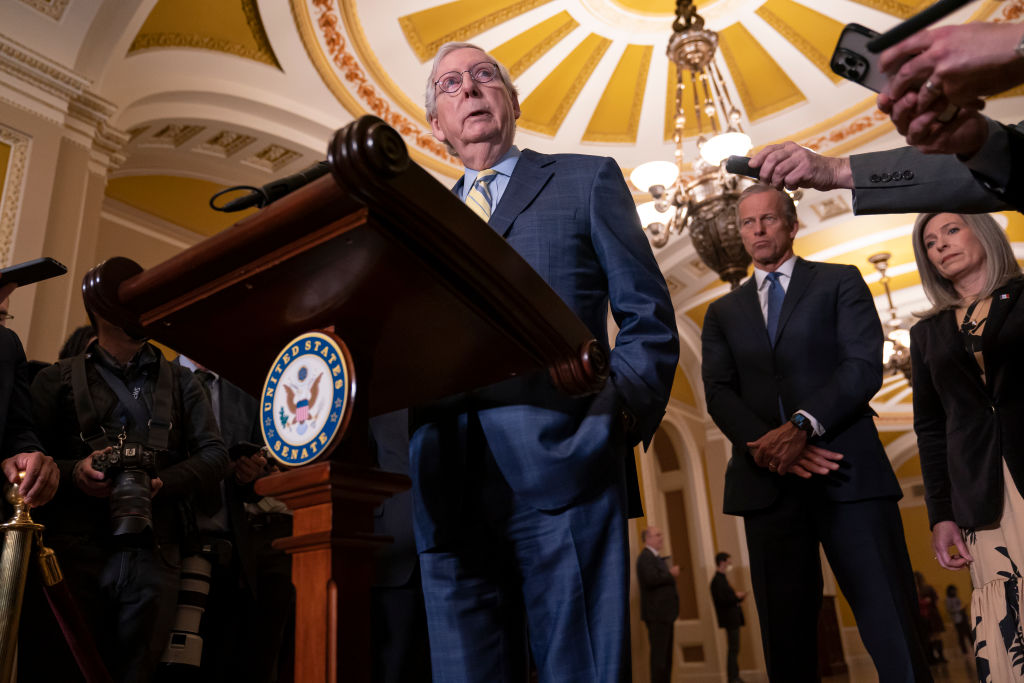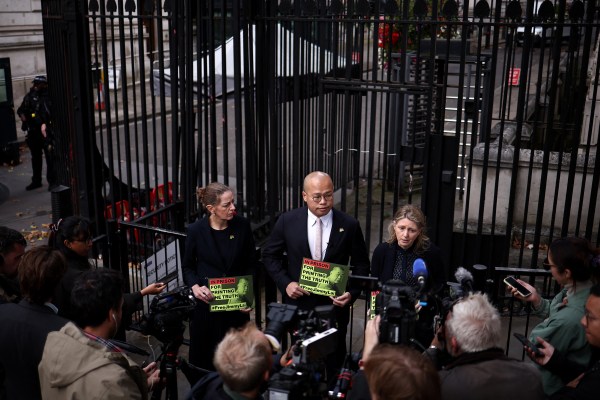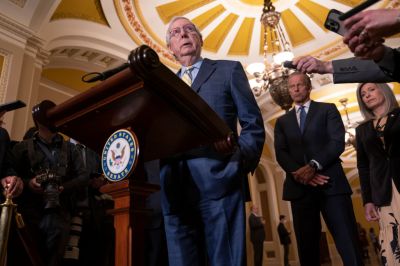Senate Democrats’ post-midterm adrenaline high is already starting to wane.
Two days after Sen. Raphael Warnock won in Georgia—capping an election cycle in which every Democratic Senate incumbent won reelection—Arizona Sen. Kyrsten Sinema announced last week she is leaving the Democratic Party to be an independent. Even though she will continue to align broadly with Democrats, the party will have to decide whether to support her reelection campaign.
One possible alternative for Democrats is Arizona Rep. Ruben Gallego, who confirmed to The Dispatch Monday that his team has “been preparing for something like this” and that he will “make a decision” in 2023. He rebuffed the notion that a Democratic challenge to Sinema would split the vote in the GOP’s favor.
“I think quite the opposite,” Gallego told reporters. “By her running, it guarantees a Democrat will win.”
Sinema’s switch is a boon for Republicans who are already optimistic about flipping the upper chamber in 2024. Seats occupied by Democrats are up for grabs in Montana, Nevada, West Virginia, Ohio, Pennsylvania, Minnesota, Michigan, and Wisconsin—battlegrounds that are all fertile ground for the GOP, especially if any of those Democrats choose to retire in the coming months.
Some of those races are already starting to take shape.
In Wisconsin, one promising GOP Senate recruit could be Rep. Mike Gallagher, a Marine veteran tapped last week to chair the newly created House Select Committee on China next Congress. A prospective Senate run is “not on my mind,” he told The Dispatch last week, though he has in recent years become the subject of speculation about a Senate run.
“I just got appointed chair of the Select Committee on China, so fully focused on that. There’s no hidden conspiracy here.” He is widely seen as a strong contender should he get in the race.
The picture is getting clearer elsewhere. In West Virginia, GOP Rep. Alex Mooney has already announced a bid for the seat currently occupied by Democratic Sen. Joe Manchin. And in Pennsylvania, former Senate GOP candidate Dave McCormick—who lost a 2022 primary against Dr. Mehmet Oz—will likely challenge Democratic Sen. Bob Casey in 2024.
Two other prospective Senate GOP candidates have teased interest in Montana: GOP Rep. Matt Rosendale and Rep.-elect Ryan Zinke, who won the state’s second and newly apportioned seat, may both vie for the nomination to challenge Democratic Sen. Jon Tester. “I think it will be Zinke or Rosendale. And I think they’ll clear the field,” Tester recently told Politico.
Rosendale has run against Tester before and is now one of a handful of House Freedom Caucus members to declare he will vote against House GOP Leader Kevin McCarthy for speaker of the House next month. He penned an op-ed in a local Montana newspaper last week to vocalize his no-vote, which could serve as campaign fodder for GOP primary voters.
The race to succeed retiring Indiana GOP Sen. Mike Braun—who is running for governor—is also underway. Republican Reps. Victoria Spartz and Jim Banks have both signaled they’re considering running. Former Indiana Gov. Mitch Daniels is also reportedly considering a Senate bid, according to the Evansville Courier & Press.
That seat in deep-red Indiana marks one of 11 that Senate Republicans will try to defend in 2024. But their newly elected campaign chief is bullish about flipping some of the 23 seats Democrats will defend—especially in the battleground states. “You can look at the map and see it’s pretty clear,” said Sen. Steve Daines of Montana, who will head up the National Republican Senatorial Committee (NRSC) next cycle.
“There’s a lot of time between now and November of 2024,” Daines told reporters Monday. “Things are just starting to get geared up.”
But the party’s success in 2024 depends on a number of factors, including who ends up being the Republican presidential nominee, what the economy looks like then, and whether Senate Republican leaders can recruit strong general election candidates.
“I’m really excited about the opportunity of having Steve Daines heading up the NRSC here,” Senate Republicans’ newly elected Policy Chair Joni Ernst said in a brief interview Monday. She also emphasized the importance of having “really great candidates” in 2024.
That issue hobbled Republican Senate candidates in 2022—an election cycle marked by party infighting over primary strategies, fundraising, and MAGA-aligned battleground candidates who failed to win in Nevada, Georgia, Pennsylvania, and Arizona.
“We want to see candidates that win a primary, that can win a general election, ” Daines said recently.
It’s an indication he might be open to boosting favored candidates ahead of primaries—a strategic departure from his NRSC predecessor Sen. Rick Scott and one that matches the preferred strategy of Senate Minority Leader Mitch McConnell.
McConnell’s super PAC, the Senate Leadership Fund (SLF), invested heavily this midterm season in a number of key primary races. It spent millions propping up Alaska’s Lisa Murkowski, who staved off a far-right challenger in her runoff, and fighting against Eric Greitens in Missouri, Mo Brooks in Alabama, and Don Bolduc in New Hampshire—all of whom said on the campaign trail they’d vote against McConnell as leader.
Meanwhile McConnell and his allies have spent the weeks following the election vilifying Scott’s wait-and-see approach. “We ended up having a candidate quality [issue]” McConnell told reporters Tuesday. “Look at Arizona, look at New Hampshire, and a challenging situation in Georgia as well.”







Please note that we at The Dispatch hold ourselves, our work, and our commenters to a higher standard than other places on the internet. We welcome comments that foster genuine debate or discussion—including comments critical of us or our work—but responses that include ad hominem attacks on fellow Dispatch members or are intended to stoke fear and anger may be moderated.
With your membership, you only have the ability to comment on The Morning Dispatch articles. Consider upgrading to join the conversation everywhere.